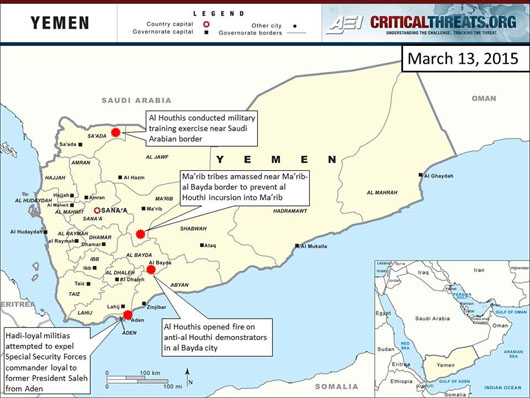The al Houthis, who have de facto control of parts of northern Yemen and the Sana’a-based central government, publicly strengthened their economic ties with Iran and continue to demonstrate their opposition to Gulf interference in Yemen. The al Houthis and former President Ali Abdullah Saleh may be cooperating in order to isolate Abdu Rabbu Mansour Hadi and his rival government in Aden.
The al Houthis and former President Ali Abdullah Saleh are attempting to isolate Abdu Rabbu Mansour Hadi in Aden. Special Security Forces (SSF), led by Abdul Hafiz al Saqqaf, were in control of Aden International Airport by March 10, limiting international visitors’ access to Hadi. In response, Militias loyal to Hadi attempted to retake Aden International Airport from the SSF on March 11. Fighting between the SSF and pro-Hadi forces—which are reinforced by units from the 119th Infantry Brigade and civilian militias from Abyan and Shabwah—escalated on March 12. Al Saqqaf continues to refuse to relinquish command of the SSF in Aden, even after Hadi appointed a new commander. Saleh earlier this week accused Hadi of destroying the country and called on him to go into exile.
The al Houthis exhibited their military strength along Yemen’s border with Saudi Arabia as they publicly strengthen ties with Iran. The al Houthi militants conducted a series of military exercises with heavy weaponry in al Buqa, Sa’ada, on March 12. The show of force may have been a message to Saudi Arabia, which deployed military assets against the al Houthis in the last round of fighting in 2009-2010 and later agreed to a ceasefire. The al Houthis also announced that Iran expressed willingness to provide oil and gas to Yemen, a replacement for revoked Saudi assistance, and to help maintain an electric plant in Ma’rib, east of Sana’a. The announcement comes after an al Houthi delegation went to Tehran the previous week. Al Houthi leader Abdul Malik al Houthi accused Gulf States of supporting al Qaeda in the Arabian Peninsula (AQAP) and criticized Yemen’s Sunni al Islah (Reform) party in a March 10 televised address. The speech was notable for Abdul Malik’s use of sectarian rhetoric to criticize Sunni actors in Yemen.
Al Houthis used violence to dissipate protests in al Bayda. Al Houthi militants opened fire on anti-al Houthi demonstrators in al Bayda city, southern al Bayda on March 12, killing one person and wounding eight others. Al Bayda city is near areas where al Houthis have recently been battling AQAP’s insurgent arm, Ansar al Sharia, and allied tribes. There is a growing danger that Ansar al Sharia will establish a sustained presence in al Bayda as tribal resentment of the al Houthis grows.
Factions of Yemen’s Southern Movement have suspended political protests in face of the current instability. A pro-secessionist spokesman for Southern Movement demonstrators in Aden, Radfan al Dubais, stated on March 10 that ongoing protests will be suspended due to growing instability and the presence of international actors in Aden. Al Dubais also suggested that factions of the Southern Movement are waiting to see what happens with Hadi’s government in Aden before making any push for secession. Southern leaders are expected to meet in Abu Dhabi next week to discuss the South’s political situation. It is unlikely the Southern Movement will be able to unify to contest Hadi’s government.
The Gulf Cooperation Council (GCC) continues to seek a political solution to the Yemen crisis. The GCC reaffirmed its support for Hadi as Yemen’s president and called for parties to participate in talks in the Saudi capital, Riyadh. The statement called for stakeholders to abide by the 2011 GCC initiative that established a political transition process for Yemen. The GCC also stated the al Houthis were welcome to join the political talks.
Divides between Yemen’s political actors are deepening, complicating the prospects of a political solution. Divided loyalties within the security forces, between the SSF and the military, for example, will only drive further armed conflict. AQAP will be able to build off of anti-al Houthi sentiment among local populations in Yemen’s southern and central governorates in order to expand.
← PREVIOUS NEXT → |

